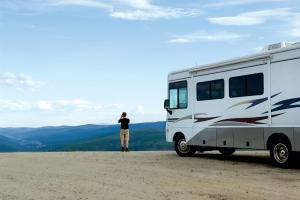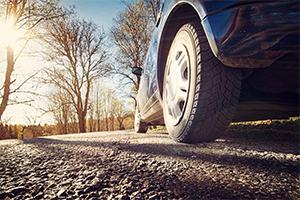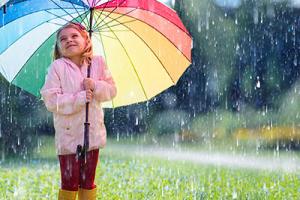RV and camper safety tips

Recreational vehicles (RVs) and campers are great travel options for road trips with friends and family. When operating an RV or camper, it is important to practice safe habits to reduce the risk of fires and driving accidents. In the United States alone, over 4,000 RV fires are reported to emergency services annually, resulting in over $60 million in losses. Additionally, about 75,000 hospitalizations occur every year from RV-related accidents.
Practice these safety tips to properly maintain your RV or camper and keep your loved ones safe, on and off the road.
Preventing a fire
- Install smoke alarms and make sure they are working properly before traveling.
- Do not smoke inside of your RV or camper.
- Stay in the kitchen while you cook and keep flammable items such as paper and plastic products away from the stovetop.
- Check refrigerators, furnaces, ovens and stovetops for propane leaks and keep a leak detector inside the vehicle. Propane should be shut off when it is not being used and any spills should be cleaned up immediately.
- Keep campfires at least 25 feet away from anything flammable.
- Know your safety exits and have all passengers practice a fire escape plan. Ensure that windows can open and close easily. Each passenger should know at least two exits to use in the event of an emergency.
- Never keep camping lanterns and heaters on while you are sleeping.
- Keep a portable fire extinguisher in the vehicle for small fires. Only adults who know how to operate the fire extinguisher should use it.
- Park your RV or camper in safe areas avoiding tall, dry grass that can catch fire easily.
Maintaining your vehicle
- Create a safety checklist to use before you travel including checking the tire pressure and oil, looking under the hood and making sure exterior lights and turn signals are working properly.
- Have the engine checked by a mechanic at least once a year.
- Add tire pressure monitors – tires should be replaced 10 years after their date of manufacture regardless of their appearance.
- Keep up with vehicle maintenance regularly according to your manufacturer’s recommendations.
Practice safe driving
- Wear your seatbelt while the vehicle is moving. Pull over if you or your passengers need to use the kitchen or restroom.
- RVs and campers should be loaded with passengers based on weight capacity. Keep the weight of towed vehicles, cargo and water tanks in mind and balance the weight accordingly.
- Stow items securely to help ensure they won’t move while the vehicle is in motion.
- Be sure to have plenty of practice operating your RV or camper before traveling, as it is quite different from driving a car or pickup truck. A safe place to practice driving is in an open parking lot or on an empty road.
- Install a backup camera in your RV or camper if it does not have one. While the camera will be helpful for driving in reverse, having someone stand outside the vehicle to check your blind spots is an additional way to stay safe.
Are you protected from out-of-pocket costs in the event of a loss or accident? Talk to your independent agent today and check out The Hanover’s recreational vehicles coverage to see what is right for you.
Sources:
Related resources
RV and camper safety tips
Recreational vehicles (RVs) and campers are great travel options for road trips with friends and family. When operating an RV or camper, it is important to practice safe habits to reduce the risk of fires and driving accidents. In the United States alone, over 4,000 RV fires are reported to emergency services annually, resulting in over $60 million in losses. Additionally, about 75,000 hospitalizations occur every year from RV-related accidents.
Practice these safety tips to properly maintain your RV or camper and keep your loved ones safe, on and off the road.
Preventing a fire
- Install smoke alarms and make sure they are working properly before traveling.
- Do not smoke inside of your RV or camper.
- Stay in the kitchen while you cook and keep flammable items such as paper and plastic products away from the stovetop.
- Check refrigerators, furnaces, ovens and stovetops for propane leaks and keep a leak detector inside the vehicle. Propane should be shut off when it is not being used and any spills should be cleaned up immediately.
- Keep campfires at least 25 feet away from anything flammable.
- Know your safety exits and have all passengers practice a fire escape plan. Ensure that windows can open and close easily. Each passenger should know at least two exits to use in the event of an emergency.
- Never keep camping lanterns and heaters on while you are sleeping.
- Keep a portable fire extinguisher in the vehicle for small fires. Only adults who know how to operate the fire extinguisher should use it.
- Park your RV or camper in safe areas avoiding tall, dry grass that can catch fire easily.
Maintaining your vehicle
- Create a safety checklist to use before you travel including checking the tire pressure and oil, looking under the hood and making sure exterior lights and turn signals are working properly.
- Have the engine checked by a mechanic at least once a year.
- Add tire pressure monitors – tires should be replaced 10 years after their date of manufacture regardless of their appearance.
- Keep up with vehicle maintenance regularly according to your manufacturer’s recommendations.
Practice safe driving
- Wear your seatbelt while the vehicle is moving. Pull over if you or your passengers need to use the kitchen or restroom.
- RVs and campers should be loaded with passengers based on weight capacity. Keep the weight of towed vehicles, cargo and water tanks in mind and balance the weight accordingly.
- Stow items securely to help ensure they won’t move while the vehicle is in motion.
- Be sure to have plenty of practice operating your RV or camper before traveling, as it is quite different from driving a car or pickup truck. A safe place to practice driving is in an open parking lot or on an empty road.
- Install a backup camera in your RV or camper if it does not have one. While the camera will be helpful for driving in reverse, having someone stand outside the vehicle to check your blind spots is an additional way to stay safe.
Are you protected from out-of-pocket costs in the event of a loss or accident? Talk to your independent agent today and check out The Hanover’s recreational vehicles coverage to see what is right for you.
Sources:
Related resources
RV and camper safety tips
Recreational vehicles (RVs) and campers are great travel options for road trips with friends and family. When operating an RV or camper, it is important to practice safe habits to reduce the risk of fires and driving accidents. In the United States alone, over 4,000 RV fires are reported to emergency services annually, resulting in over $60 million in losses. Additionally, about 75,000 hospitalizations occur every year from RV-related accidents.
Practice these safety tips to properly maintain your RV or camper and keep your loved ones safe, on and off the road.
Preventing a fire
- Install smoke alarms and make sure they are working properly before traveling.
- Do not smoke inside of your RV or camper.
- Stay in the kitchen while you cook and keep flammable items such as paper and plastic products away from the stovetop.
- Check refrigerators, furnaces, ovens and stovetops for propane leaks and keep a leak detector inside the vehicle. Propane should be shut off when it is not being used and any spills should be cleaned up immediately.
- Keep campfires at least 25 feet away from anything flammable.
- Know your safety exits and have all passengers practice a fire escape plan. Ensure that windows can open and close easily. Each passenger should know at least two exits to use in the event of an emergency.
- Never keep camping lanterns and heaters on while you are sleeping.
- Keep a portable fire extinguisher in the vehicle for small fires. Only adults who know how to operate the fire extinguisher should use it.
- Park your RV or camper in safe areas avoiding tall, dry grass that can catch fire easily.
Maintaining your vehicle
- Create a safety checklist to use before you travel including checking the tire pressure and oil, looking under the hood and making sure exterior lights and turn signals are working properly.
- Have the engine checked by a mechanic at least once a year.
- Add tire pressure monitors – tires should be replaced 10 years after their date of manufacture regardless of their appearance.
- Keep up with vehicle maintenance regularly according to your manufacturer’s recommendations.
Practice safe driving
- Wear your seatbelt while the vehicle is moving. Pull over if you or your passengers need to use the kitchen or restroom.
- RVs and campers should be loaded with passengers based on weight capacity. Keep the weight of towed vehicles, cargo and water tanks in mind and balance the weight accordingly.
- Stow items securely to help ensure they won’t move while the vehicle is in motion.
- Be sure to have plenty of practice operating your RV or camper before traveling, as it is quite different from driving a car or pickup truck. A safe place to practice driving is in an open parking lot or on an empty road.
- Install a backup camera in your RV or camper if it does not have one. While the camera will be helpful for driving in reverse, having someone stand outside the vehicle to check your blind spots is an additional way to stay safe.
Are you protected from out-of-pocket costs in the event of a loss or accident? Talk to your independent agent today and check out The Hanover’s recreational vehicles coverage to see what is right for you.
Sources:
Related resources
RV and camper safety tips
Recreational vehicles (RVs) and campers are great travel options for road trips with friends and family. When operating an RV or camper, it is important to practice safe habits to reduce the risk of fires and driving accidents. In the United States alone, over 4,000 RV fires are reported to emergency services annually, resulting in over $60 million in losses. Additionally, about 75,000 hospitalizations occur every year from RV-related accidents.
Practice these safety tips to properly maintain your RV or camper and keep your loved ones safe, on and off the road.
Preventing a fire
- Install smoke alarms and make sure they are working properly before traveling.
- Do not smoke inside of your RV or camper.
- Stay in the kitchen while you cook and keep flammable items such as paper and plastic products away from the stovetop.
- Check refrigerators, furnaces, ovens and stovetops for propane leaks and keep a leak detector inside the vehicle. Propane should be shut off when it is not being used and any spills should be cleaned up immediately.
- Keep campfires at least 25 feet away from anything flammable.
- Know your safety exits and have all passengers practice a fire escape plan. Ensure that windows can open and close easily. Each passenger should know at least two exits to use in the event of an emergency.
- Never keep camping lanterns and heaters on while you are sleeping.
- Keep a portable fire extinguisher in the vehicle for small fires. Only adults who know how to operate the fire extinguisher should use it.
- Park your RV or camper in safe areas avoiding tall, dry grass that can catch fire easily.
Maintaining your vehicle
- Create a safety checklist to use before you travel including checking the tire pressure and oil, looking under the hood and making sure exterior lights and turn signals are working properly.
- Have the engine checked by a mechanic at least once a year.
- Add tire pressure monitors – tires should be replaced 10 years after their date of manufacture regardless of their appearance.
- Keep up with vehicle maintenance regularly according to your manufacturer’s recommendations.
Practice safe driving
- Wear your seatbelt while the vehicle is moving. Pull over if you or your passengers need to use the kitchen or restroom.
- RVs and campers should be loaded with passengers based on weight capacity. Keep the weight of towed vehicles, cargo and water tanks in mind and balance the weight accordingly.
- Stow items securely to help ensure they won’t move while the vehicle is in motion.
- Be sure to have plenty of practice operating your RV or camper before traveling, as it is quite different from driving a car or pickup truck. A safe place to practice driving is in an open parking lot or on an empty road.
- Install a backup camera in your RV or camper if it does not have one. While the camera will be helpful for driving in reverse, having someone stand outside the vehicle to check your blind spots is an additional way to stay safe.
Are you protected from out-of-pocket costs in the event of a loss or accident? Talk to your independent agent today and check out The Hanover’s recreational vehicles coverage to see what is right for you.
Sources:





